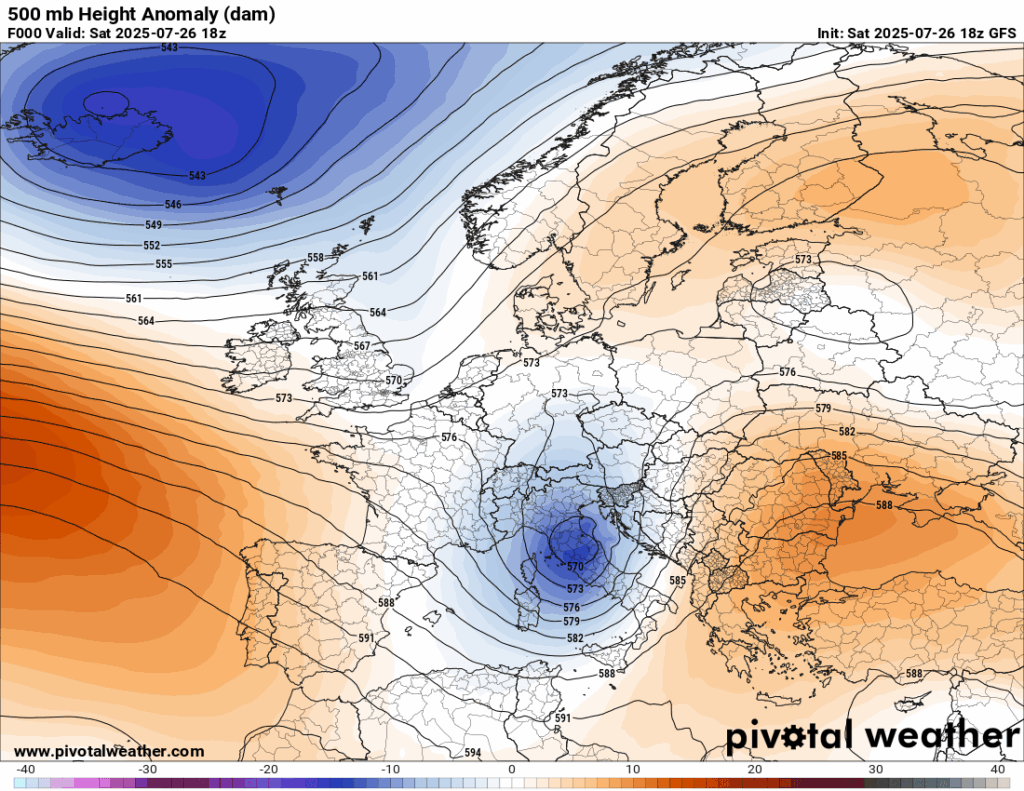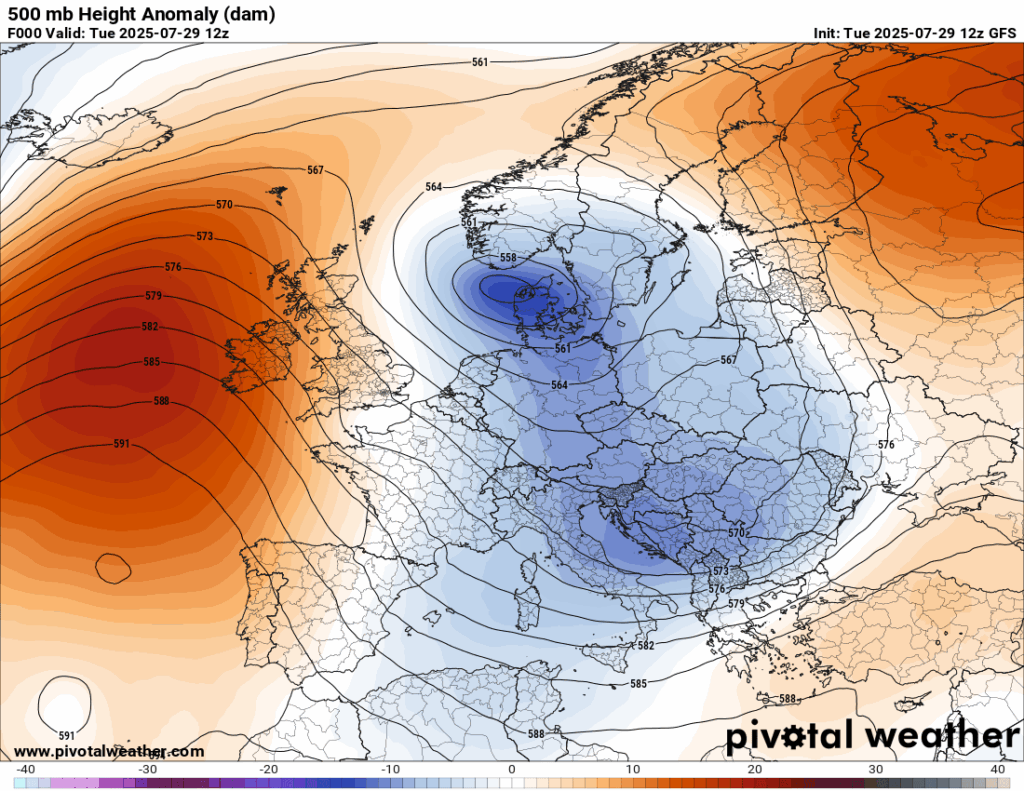Main Topic: Turkish/Greek Historic Heatwave Leads to More Big Wildfires
Dear Diary. While Heatwave Pemex rages over here in the states, other notable pockets of extreme temperatures under separate heat domes have been raging. Today we will focus on a Turkish/Greek heatwave.
According to many climate scientists who trust climate models, the Mediterranean area is quite susceptible to desertification with the Sahara having a tendency of moving northward into Spain, Italy, Greece and Turkey. Over the last couple of years, we have seen awful heat leading to drought and wildfires over some of those countries. In particular, Greece has been hit hard. Over this month yet another heatwave has plagued the eastern Mediterranean region with the worst effects centered over Turkey.
twitter.com
Here is the state of the heat dome on Saturday before it thankfully collapsed:
 Note the 588+ decameter heat dome over Turkey and Greece via the above Pivotal Weather chart. Note the 588+ decameter heat dome over Turkey and Greece via the above Pivotal Weather chart.
Today a cool pool of air is beginning to ease this heatwave:

Here are some of the latest news from Yahoo News:
yahoo.com
Turkey, Bulgaria battle wildfires amid Mediterranean heatwaveMahmut Bozarslan with Anne Chaon
Mon, July 28, 2025 at 11:49 AM EDT
 Wildfires across Turkey over the past week have led to at least 14 deaths (ONUR YURTSEVER) Wildfires across Turkey over the past week have led to at least 14 deaths (ONUR YURTSEVER)
ONUR YURTSEVER/AFP/AFP
Firefighters battled blazes across Turkey and Bulgaria on Monday as a deadly heatwave went into a second week around much of the Mediterranean.
There have been at least 14 deaths in the past week in Turkey and about 20 villages have been evacuated, according to officials.
In neighbouring Bulgaria, emergency services fought more than 160 wildfires across the country on Monday. Greece also struggled to clear up after a week of forest fires and Spanish planes went to help Portuguese firefighters tackling a blaze on a remote mountain.
“We are burning up, we don’t even know where to go anymore,” Asmin Gezginci, 24, said while returning from a park to her home in the Kurdish-majority southeastern Turkish city of Diyarbakir.
Temperatures soared to a record high of 50.5 degrees Celsius (123 Fahrenheit) on Friday in Silopi, two hours from Gezginci’s home.
According to forecasts, the temperatures will remain fiery this week with 45C to 50C heat expected in southeast Turkey on Tuesday.
On Monday, authorities in Diyarbakir warned residents that temperatures would remain above the seasonal average until August 2. The thermometer was already showing 45.4C at midday Monday.
The heatwave has exacerbated forest fires that have spread rapidly in windy conditions.
Firefighters tackled blazes around Bursa in the northwest, Turkey’s fourth-largest city and a major industrial centre, for the third consecutive day.
Amid strong winds that fanned the flames, some residents used tractors to transport water tanks, while television images showed others rushing toward the fires carrying bottles of water.
“Given the size and intensity of the fires, the state’s ability to respond quickly to such disasters is sometimes limited,” Turkish Agriculture and Forestry Minister Ibrahim Yumakli acknowledged.
“If there is wind, there are no planes, and it takes hours, even days, for you to take control,” he said.
In recent days, 19 villages had to be evacuated in the Safranbolu region in the north, and more than 3,500 people around Bursa.
In a televised speech, President Recep Tayyip Erdogan said 96 percent of the fires were caused by human activity such as cigarette butts and picnic fires.
He said more than 3,000 fires have broken out since the beginning of summer and some have been arson.
“Let us not forget that this is a war, a defence of our green homeland, against this insidious enemy,” Erdogan said.
Last week, one wildfire killed at least 10 forest workers and rescuers fighting a blaze near Eskisehir in western Turkey.
A firefighter battling the flames died of a heart attack on Saturday. Three more people died Sunday in an accident involving a water tanker truck, Bursa authorities said.
Authorities say the risk of fires will remain high until October. And a UN report on desertification worldwide estimates that 88 percent of Turkey’s territory is at risk: rainfall is expected to decrease 30 percent by the end of the century, while temperatures are expected to rise by 5C to 6C compared to the averages recorded between 1961 and 1990.
– New fire in Greece –Emergency services in Bulgaria have fought more than 160 active wildfires. Some that broke out Friday destroyed about 20 homes in the village of Rani Lug close to the Serbian border.
The Black Sea nation also requested EU help, with two Swedish aircraft being deployed to help. Helicopters from Slovenia, the Czech Republic, Hungary, France and Romania were also at work on Monday.
In Greece, where blazes have ravaged homes and sparked evacuations across the country this summer, firefighters brought dozens of wildfires under control over the weekend.
But a new inferno broke out near a university campus east of Athens, in Zografou municipality. Some 65 firefighters, 20 vehicles, seven helicopters and six planes were mobilised to contain the flames, authorities said.
Greece has endured heatwave conditions for a week, with temperatures passing 40C in many areas.
On the Iberian Peninsula, four Spanish planes joined more than 250 Portuguese firefighters battling a mountain blaze in Viana do Castelo district on the Portuguese-Spanish border. The flames were spreading in two directions and difficult to tackle because of strong winds, civil protection chief Marco Domingues said.
Authorities have put much of northern and southern Portugal on the highest alert for wildfires because of heat and winds.
Here are more “ET’s” recorded from around the planet the last couple of days, their consequences, and some extreme temperature outlooks, as well as any extreme precipitation reports:
twitter.com
twitter.com
twitter.com
twitter.com
twitter.com
twitter.com
Here is More Climate News from Tuesday:
(As usual, this will be a fluid post in which more information gets added during the day as it crosses my radar, crediting all who have put it on-line. Items will be archived on this site for posterity. In most instances click on the pictures of each tweet to see each article. The most noteworthy items will be listed first.)
The chances of seeing extreme fire weather are roughly double in today’s climate compared with the preindustrial period. “It really puts to bed any debate about the role of climate change in driving these extreme fires,” Dr. Cunningham said. — Dr. Jeff Masters (@drjeffmasters.bsky.social) 2025-07-28T19:13:58.906Z
twitter.com
twitter.com
I've been informed by reliable White House sources that if we don't monitor climate change it's not happening. /s — Lilly of Copper Island (@lillysrouter.bsky.social) 2025-07-28T22:51:45.802Z
twitter.com
twitter.com
twitter.com
twitter.com
twitter.com
More from the Weather Department:
twitter.com
twitter.com
Clear examples of the degraded forecasts we face in this piece from @michaelrlowry.bsky.social
Here's Iona from yesterday, with a clear shot of its internal structure in the current state on top, and a useless green blob in the suggested replacement on bottom. — Kelly Hereid (@kellyhereid.bsky.social) 2025-07-29T11:43:53.788Z
Hurricane #Iona looks to be going through some explosive intensification. Most recent 03:00 UTC assessment is 75kt (!) but this could be a major by now *at least*. The storm is passing over 800mi (1300km) SSE of Hawai'i traveling westward. — Jimmy Yunge (Yunny, human hurricane) ☀️⛈️☂️🕶️ (@jimmy-yunge.bsky.social) 2025-07-29T03:47:58.487Z
Here’s one to bookmark: a unique, human-curated, multi-sourced list of the deadliest U.S. flash floods, river floods, and storm surges. This month’s TX flash floods were the nation’s deadliest in nearly 50 years. — Bob Henson (@bhensonweather.bsky.social) 2025-07-29T02:37:33.701Z
wrote about Colorado's peak flash flood season (it's here!) and the potential risk in the coming week. #cowx
climate.colostate.edu/blog/index.p... — Russ Schumacher (@rschumacher.cloud) 2025-07-27T23:56:26.886Z
Today’s News on Sustainable Energy, Traditional Polluting Energy from Fossil Fuel, and the Green Revolution:
twitter.com
More on the Environment, Nature and Science:
twitter.com
If you like these posts and my work on record temperature ratios, please contribute via my PayPal widget on this site. Thanks in advance for any support. |





 Note the 588+ decameter heat dome over Turkey and Greece via the above Pivotal Weather chart.
Note the 588+ decameter heat dome over Turkey and Greece via the above Pivotal Weather chart.
 Wildfires across Turkey over the past week have led to at least 14 deaths (ONUR YURTSEVER)
Wildfires across Turkey over the past week have led to at least 14 deaths (ONUR YURTSEVER)